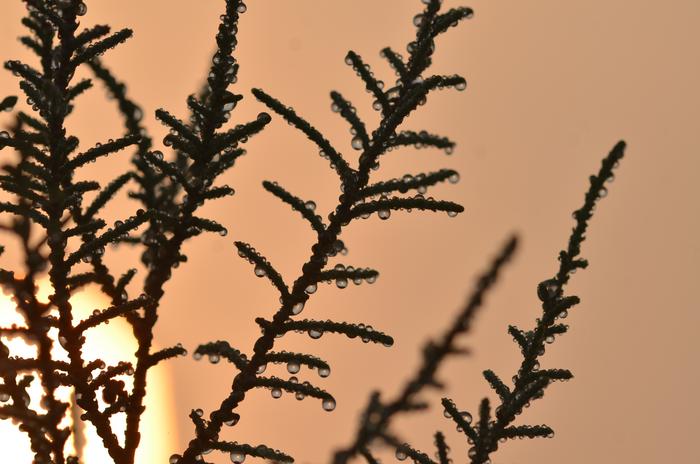Abu Dhabi, UAE, October 2023: A team of scientists, led by Post-Doctoral Associate Marieh Al-Handawi and Professor of Chemistry Panče Naumov from NYU Abu Dhabi’s Smart Materials Lab and NYU Abu Dhabi Institute’s Center for Smart Engineering Materials (CSEM) has revealed the mechanism a desert plant native to the United Arab Emirates uses to capture moisture from the desert air in order to survive. The identification of this unique mechanism, in which the plant excretes salts to extract and condense water onto the surface of its leaves, has the potential to inspire the development of new technologies, and improve existing ones such as cloud seeding, to harness atmospheric water resources.

Credit: Post-Doctoral Associate Marieh Al-Handawi, NYU Abu Dhabi
Abu Dhabi, UAE, October 2023: A team of scientists, led by Post-Doctoral Associate Marieh Al-Handawi and Professor of Chemistry Panče Naumov from NYU Abu Dhabi’s Smart Materials Lab and NYU Abu Dhabi Institute’s Center for Smart Engineering Materials (CSEM) has revealed the mechanism a desert plant native to the United Arab Emirates uses to capture moisture from the desert air in order to survive. The identification of this unique mechanism, in which the plant excretes salts to extract and condense water onto the surface of its leaves, has the potential to inspire the development of new technologies, and improve existing ones such as cloud seeding, to harness atmospheric water resources.
Tamarix aphylla, or athel tamarisk, is a halophytic desert shrub, meaning it can survive in hypersaline conditions. Over time, the plant has evolved to take full advantage of the prevalent humidity and fog occurrences in the UAE. Many plants and animals that inhabit arid regions have developed water-harvesting mechanisms and morphophysiological traits which have given them the ability to utilize abundant, untapped sources of water such as fog and dew. The fundamental principles governing this natural water collection serve as an inspiration for emerging water-collection technologies, which are developed to maximize the efficiency of the existing methods for harvesting aerial humidity.
In the paper titled Harvesting of Aerial Humidity with Natural Hygroscopic Salt Excretions published in the journal Proceedings of the National Academy of Sciences of the United States of America, the researchers present their exploration of the physicochemical aspects of salt release and water collection mechanisms by Tamarix aphylla that has allowed it to thrive in hypersaline sands.
The plant absorbs saline water from the soil through its roots, filters out the salt, and expels the concentrated salt solution onto the outer surface of its leaves. The researchers found that as the salt solution undergoes evaporation, it transforms into a hygroscopic crystalline mixture composed of at least ten different minerals. It was discovered that some of these salt crystals have the ability to attract moisture from the air even when the humidity levels are reasonably low (~55% relative humidity). This moisture condenses onto the surface of the plant’s leaves and is then absorbed.
“Our findings not only reveal a unique, natural complex mechanism for water utilization, they also open prospects for designing environmentally benign formulations based on a biogenic salt mixture that could be used for efficient harvesting of aerial water or cloud seeding at low humidity,” said lead author Al-Handawi. “This holds the promise of revolutionizing cloud seeding practices by rendering them more effective and environmentally friendly, while also aligning with our responsibility to use the planet’s scarce water resources wisely.”
The global scarcity of freshwater has stimulated research into alternative water-harvesting technologies to supplement the existing conventional resources in water-stressed locations. Within a broader context, this natural mechanism developed by the research team for harvesting humidity using environmentally benign salts as moisture adsorbents could provide a bioinspired approach that complements the currently available water collection or cloud-seeding technologies.
This research is being carried out in the same period that NYUAD is chairing the Universities Climate Network (UCN). Comprising UAE-based universities and higher education institutions, the UCN collaborates on facilitating dialogues, workshops, public events, policy briefs, and youth participation in the lead up to and beyond COP28.
# # #
About NYU Abu Dhabi
www.nyuad.nyu.edu
NYU Abu Dhabi is the first comprehensive liberal arts and research campus in the Middle East to be operated abroad by a major American research university. NYU Abu Dhabi has integrated a highly selective program with majors in the sciences, engineering, social sciences, arts, and humanities with a world center for advanced research. Its campus enables students to succeed in an increasingly interdependent world, and to advance cooperation and progress on humanity’s shared challenges. NYU Abu Dhabi’s high-achieving students have come from some 125 countries and speak over 100 languages. Together, NYU’s campuses in New York, Abu Dhabi, and Shanghai form the backbone of a unique global university, giving faculty and students opportunities to experience varied learning environments and immersion in other cultures at one or more of the numerous study-abroad sites NYU maintains on six continents.
Journal
Proceedings of the National Academy of Sciences
Article Title
Harvesting of Aerial Humidity with Natural Hygroscopic Salt Excretions




